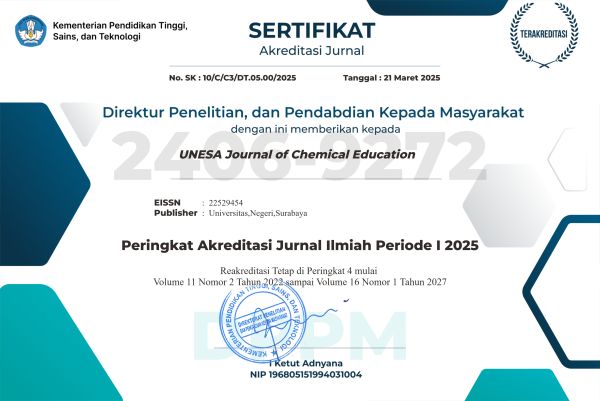EVALUATING CHEMISTRY TEXTBOOKS IN GHANAIAN SENIOR HIGH SCHOOLS: A FOCUS ON THE PRESENTATION OF QUALITATIVE ANALYSIS AND PERSPECTIVES OF TEACHERS AND LEARNERS
DOI:
https://doi.org/10.26740/ujced.v14n1.p8-21Keywords:
chemistry education, qualitative analysis, chemsitry textbooks, textbook evaluation, learner perspectives, teacher perspectivesAbstract
This study investigated learner and teacher perspectives of chemistry textbooks, alongside a comparative analysis of textbook variations and the presentation of qualitative analysis concepts. A mixed-methods approach was employed, surveying 466 learners and 33 teachers, and evaluating three widely used chemistry textbooks in Ghana senior high schools. The findings revealed learners' positive perspectives of textbooks, but highlighted the need for enhanced visual and digital support. Teachers prioritized curriculum alignment and guidance, yet recognized gaps in concept representation. Textbook analysis exposed varying levels of comprehensiveness, presentation styles, and omissions. The study highlights the importance of considering learner and teacher perspectives, alongside textbook variations, to inform chemistry education. Recommendations include developing learner-centered textbooks, providing teacher professional development, and ensuring curriculum alignment and comprehensive concept representation. This research contributes to the ongoing effort to improve chemistry education, informing teachers, policymakers, and textbook developers. By addressing identified gaps, teachers can foster a deeper understanding of qualitative analysis concepts and promote effective learning outcomes.
Downloads
References
Abd‐El‐Khalick, F., Myers, J. Y., Summers, R., Brunner, J., Waight, N., Wahbeh, N., Zeineddin, A. A., and Belarmino, J. 2017. A Longitudinal Analysis of The Extent and Manner of Representations of Nature of Science in US High School Biology and Physics Textbooks. Journal of Research in Science Teaching, Vol. 54, No. 1, pp. 82‒120.
Adu-Gyamfi, K., Arthur, N., and Anim-Eduful, B. 2024. Teacher General Pedagogy and Subject Matter Knowledge for Teaching Qualitative Analysis Concepts to Chemistry Students. International Education and Culture Studies, Vol. 4, No. 1, pp. 24‒45.
Ahmadi, A., and Derakhshan, A. 2016. EFL Teachers' Perceptions Towards Textbook Evaluation. Theory and Practice in Language Studies, Vol. 6, No. 2, pp. 260‒267.
Akef, K., and Moosavi, Z. 2014. Iranian EFL Teachers’ and Students’ Textbook Evaluation. The Iranian EFL Journal December 2014, Vol. 10, No. 6, pp. 24‒41.
Akkuzu, N., and Uyulgan, A. 2017. Step by Step Learning Using The I Diagram in The Systematic Qualitative Analyses of Cations Within A Guided Inquiry Learning Approach. Chemistry Education Research and Practice, Vol. 18, pp. 641‒658.
Ameyibor, K., and Wiredu, M. B. 2006. Chemistry for Senior Secondary Schools. Macmillan Education Limited: London
Anim-Eduful, B., and Adu-Gyamfi, K. 2022. Chemistry Students’ Conceptual Understanding of Organic Qualitative Analysis. Pedagogical Research, Vol. 7, No. 4, pp. 1‒13.
Ansong, B. A. 2021. Understanding Chemistry (2nd ed.). X-coco Publications: Nkwatia-Kwahu.
Allen, G., Guzman-Alvarez, A., Smith, A., Gamage, A., Molinaro, M., and Larsen, D. S. 2015. Evaluating The Effectiveness of The Open-Access Chemwiki Resource as A Replacement for Traditional General Chemistry Textbooks. Chemistry Education Research and Practice, Vol. 16, No. 4, pp. 939‒948.
Aldahmash, A. H., and Omar, S. H. 2021. Analysis of Activities Included in Saudi Arabian Chemistry Textbooks for The Inclusion of Argumentation-Driven Inquiry Skills. Studies in Educational Evaluation, Vol. 68, pp. 1‒7.
Anderson, T., and Cuttler, C. 2020. Open to Open? An Exploration of Textbook Preferences and Strategies to Offset Textbook Costs for Online Versus on-Campus Students. International Review of Research in Open and Distributed Learning, Vol. 21, No. 1, pp. 40‒60.
Bongco, R. T., and David, A. P. 2020. Filipino Teachers' Experiences as Curriculum Policy Implementers in The Evolving K to 12 Landscape. Issues in Educational Research, Vol. 30, No. 1, pp. 19‒34.
Bouabdallah, I. 2021. Utilizing Concept Maps to Remediate Prospective Physics and Chemistry Teachers’ Difficulties in Inorganic Qualitative Analysis. AJCE, Vol. 11, No. 2, pp. 1‒30.
Cambridge Assessment International Education. 2017a. Cambridge IGCSE Chemistry 0620 Syllabus for 2020 and 2021. Cambridge: Cambridge University Press.
Chiu, T. K. 2017. Introducing Electronic Textbooks as Daily‐Use Technology in Schools: A Top‐Down Adoption Process. British Journal of Educational Technology, Vol. 48, No. 2, pp. 524‒537.
Clark, K. R. 2018. Learning Theories: Constructivism. Radiologic Technology, Vol. 90, No. 2, pp. 180‒182.
Cohen, L., Manion, L., and Morrison, K. 2007. Research methods in education (6th ed.). New York: Routledge.
DeKorver, B. K., and Towns, M. H. 2016. Upper‐Level Undergraduate Chemistry Students’ Goals for Their Laboratory Coursework. Journal of Research in Science Teaching, Vol. 53, No. 8, pp. 1198‒1215.
Dockx, J., Bellens, K., and De Fraine, B. 2020. Do Textbooks Matter for Reading Comprehension? A Study in Flemish Primary Education. Frontiers in Psychology, Vol. 10, pp. 2059‒2080.
Dumon, A., and Mzoughi-Khadhraoui, I. 2014. Teaching Chemical Change Modeling to Tunisian Students: An “Expanded Chemistry Triplet” for Analyzing Teachers' Discourse. Chemistry Education Research and Practice, Vol. 15, No. 1, pp. 70‒80.
Gegios, T., Salta, K., and Koinis, S. 2017. Investigating High-School Chemical Kinetics: The Greek Chemistry Textbook and Students' Difficulties. Chemistry Education Research and Practice, Vol. 18, No. 1, pp. 151‒168.
Guerrero, G. E., Jaramillo, C. A., and Meneses, C. A., 2016, October 17-19. Mmacutp: Mobile application for teaching analytical chemistry for students on qualitative analysis [Conference session]. International Conference on Interactive Mobile Communication, Technologies and Learning, San Diego, CA. United States.
Gurung, E., Jacob, R., Bunch, Z., Thompson, B., and Popova, M. 2022. Evaluating the Effectiveness of Organic Chemistry Textbooks for Promoting Representational Competence. Journal of Chemical Education, Vol. 99, No. 5, pp. 2044‒2054.
Hanson, R. 2015. Using Micro Science Equipment to Facilitate the Study of Qualitative Analysis – A Case Study in an Undergraduate Class. European Journal of Basic and Applied Sciences, Vol. 2, No. 2, pp. 11‒18.
Haulle, E., and Kabelege, E. 2021. Relevance and Quality of Textbooks Used in Primary Education in Tanzania: A Case of Social Studies Textbooks. Contemporary Education Dialogue, Vol. 18, No. 1, pp. 12‒28.
Hrast, Š., and Savec, V. F. 2024. Textbook Sets Through the Perspective of the Orientation of the Intended Chemistry Curriculum for Primary and Secondary Schools. Acta Chimica Slovenica, Vol. 71, No. 1, pp. 143‒160.
Krejcie, R. V., and Morgan, D. W. 1970. Determining Sample Size for Research Activities. Educational and psychological measurement, Vol. 30, No. 3, pp. 607‒610.
Laabidi, H., and Nfissi, A. 2016. Fundamental Criteria for Effective Textbook Evaluation. Efl Journal, Vol. 1, No. 2, pp. 141‒159.
Lay, A. N., and Osman, K. 2018. Developing 21st Century Chemistry Learning Through Designing Digital Learning Through Designing Digital Games. Journal of Education in Science Environment and Health, Vol. 4, No. 1, pp. 81‒92.
Marpaung, D. N., and Pongkendek, J. J. 2020. Analysis of Chemistry Textbook Based on Curriculum 2013. Steam Engineering, Vol. 2, No. 1, pp. 31‒37.
McMillan, J. H., and Schumacher, S. 2010. Research in Education: Evidence-Based Inquiry, MyEducationLab Series. England: Pearson.
Ministry of Education, Science and Sport. 2010. Teaching Syllabus for Chemistry Senior High School 2-4. Accra: Curriculum research and Development Division.
Quílez, J. 2021. Supporting Spanish 11th Grade Students to Make Scientific Writing When Learning Chemistry in English: The Case of Logical Connectives. International Journal of Science Education, Vol. 43, No. 9, pp. 1459‒1482.
Rusek, M., and Vojíř, K. 2019. Analysis of Text Difficulty in Lower-Secondary Chemistry Textbooks. Chemistry Education Research and Practice, Vol. 20, No. 1, pp. 85‒94.
Saadipour, A., and Shakouri, A. 2016. A Comparative Study of English Textbooks in Iranian Non-Profit Institutes and Schools. International Journal of Multidisciplinary and Current Research, Vol. 4, pp. 322‒327.
Sarpong, F. K. 2021. Modern Chemistry for West African Senior High Schools and Colleges. Sarps Publication: Kumasi
Schoonenboom, J., and Johnson, R. B. 2017. How to Construct A Mixed Methods Research Design. KZfSS Kölner Zeitschrift für Soziologie und Sozialpsychologie, Vol. 69, No. 2, pp. 107‒131.
Seethaler, S., Czworkowski, J., and Wynn, L. 2018. Analyzing General Chemistry Texts’ Treatment of Rates of Change Concepts in Reaction Kinetics Reveals Missing Conceptual Links. Journal of Chemical Education, Vol. 95, No. 1, pp. 28‒36.
Shamsulbahri, M. M., and Zulkiply, N. 2021. Examining the Effect of Directed Activity Related to Texts (Darts) and Gender on Student Achievement in Qualitative Analysis in Chemistry. Malaysian Journal of Learning and Instruction, Vol. 18, No. 1, pp. 157‒181.
Smart, A., and Jagannathan, S. 2018. Textbook Policies in Asia: Development, Publishing, Printing, Distribution, And Future Implications. Manila: Asian Development Bank.
Syahabuddin, K., Fhonna, R., and Maghfirah, U. 2020. Teacher-Student Relationships: An Influence on The English Teaching-Learning Process. Studies in English Language and Education, Vol. 7, No. 2, pp. 393‒406.
Sujak, K. B., and Daniel, E. G. S. 2018. Understanding of Macroscopic, Microscopic and Symbolic Representations Among Form Four Students in Solving Stoichiometric Problems. MOJES: Malaysian Online Journal of Educational Sciences, Vol. 5, No. 3, pp. 83‒96.
Talanquer, V. 2018. Chemical Rationales: Another Triplet for Chemical Thinking. International Journal of Science Education, Vol. 40, No. 15, pp. 1874‒1890.
Hand, B., Choi, A. 2010. Examining the Impact of Student Use of Multiple Modal Representations in Constructing Arguments in Organic Chemistry Laboratory Classes. Res Sci Educ, Vol. 40, pp. 29–44.
Tan, K.C.D., Goh, N.K., Chia, L.S., and Treagust, D.F. 2009. Linking the Macroscopic, Sub-microscopic and Symbolic Levels: The Case of Inorganic Qualitative Analysis. In: Gilbert, J.K., Treagust, D. (eds) Multiple Representations in Chemical Education. Models and Modeling in Science Education, Vol. 4.
Vojíř, K., and Rusek, M. 2022a. Of Teachers and Textbooks: Lower Secondary Teachers' Perceived Importance and Use of Chemistry Textbook Components. Chemistry Education Research and Practice, Vol. 23, No. 4, pp. 786‒798.
WAEC. 2017. Chief Examiners’ Report for Senior Secondary School Certificate Examination. Accra: West African Examination Council.
WAEC. 2018. Chief Examiners’ Report for Senior Secondary School Certificate Examination. Accra: West African Examination Council.
WAEC. 2019. Chief Examiners’ Report for Senior Secondary School Certificate Examination. Accra: West African Examination Council.
WAEC. 2020. Chief Examiners’ Report for Senior Secondary School Certificate Examination. Accra: West African Examination Council.
WAEC. 2021. Chief Examiners’ Report for Senior Secondary School Certificate Examination. Accra: West African Examination Council.
WAEC. 2022. Chief Examiners’ Report for Senior Secondary School Certificate Examination. Accra: West African Examination Council.
WAEC. 2023. Chief Examiners’ Report for Senior Secondary School Certificate Examination. Accra: West African Examination Council.
Wain, K. 2022. Different perspectives on Evaluating Textbooks. In History and Social Studies–Methodologies of Textbook Analysis. Multinasional British: Routledge.
Waite-Stupiansky, S. 2017. Jean Piaget’s Constructivist Theory of Learning. In Theories of Early Childhood Education. Multinasional British: Routledge.
Wijaya, A., van den Heuvel-Panhuizen, M., and Doorman, M. 2015. Opportunity-to-Learn Context-Based Tasks Provided by Mathematics Textbooks. Educ Stud Math, Vol. 89, pp. 41–65.
Yin, R. K. 2014. Case Study Research: Design and Methods (5th ed.). Los Angeles: CA: Sage Publications.
Zupanc, N., and Devetak, I. 2021. The Analysis of Electrolyte Chemistry Pictorial Material in Lower Secondary School Chemistry Textbooks in Slovenia Based on Developed Quality Criteria. Scientia in Educatione, Vol. 12, No. 1, pp. 5–15.
Downloads
Published
Issue
Section
License
The license terms of the Creative Commons Attribution-NonCommercial 4.0 International (CC BY-NC 4.0) requires attribution to the original creator, permits non-commercial use, and does not allow for the application of legal or technological restrictions on others' use.
 Abstract views: 154
,
Abstract views: 154
, PDF Downloads: 167
PDF Downloads: 167













